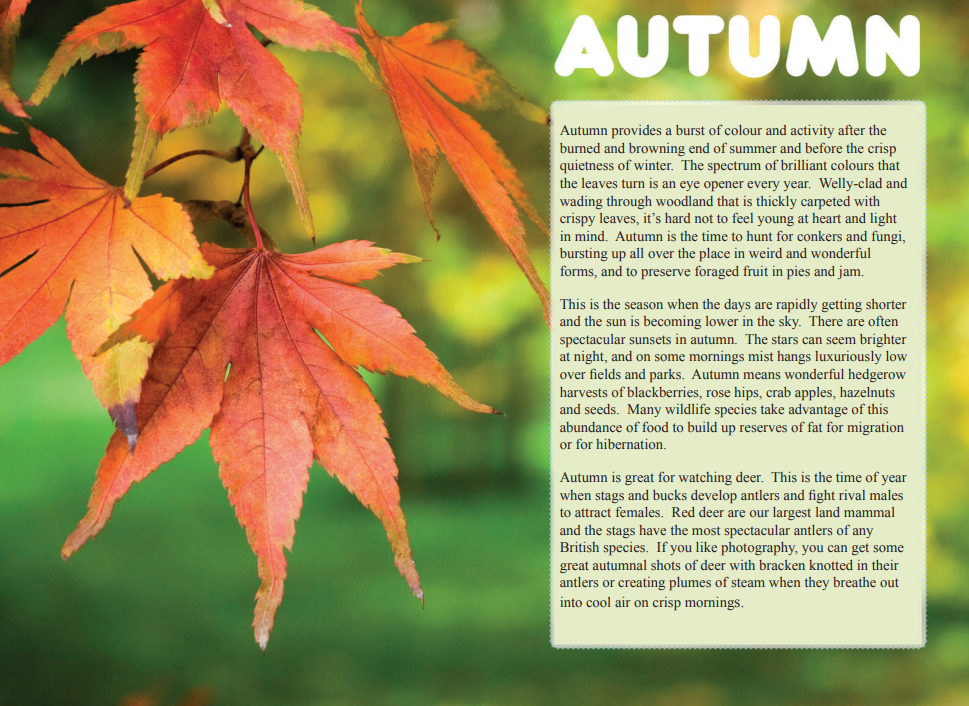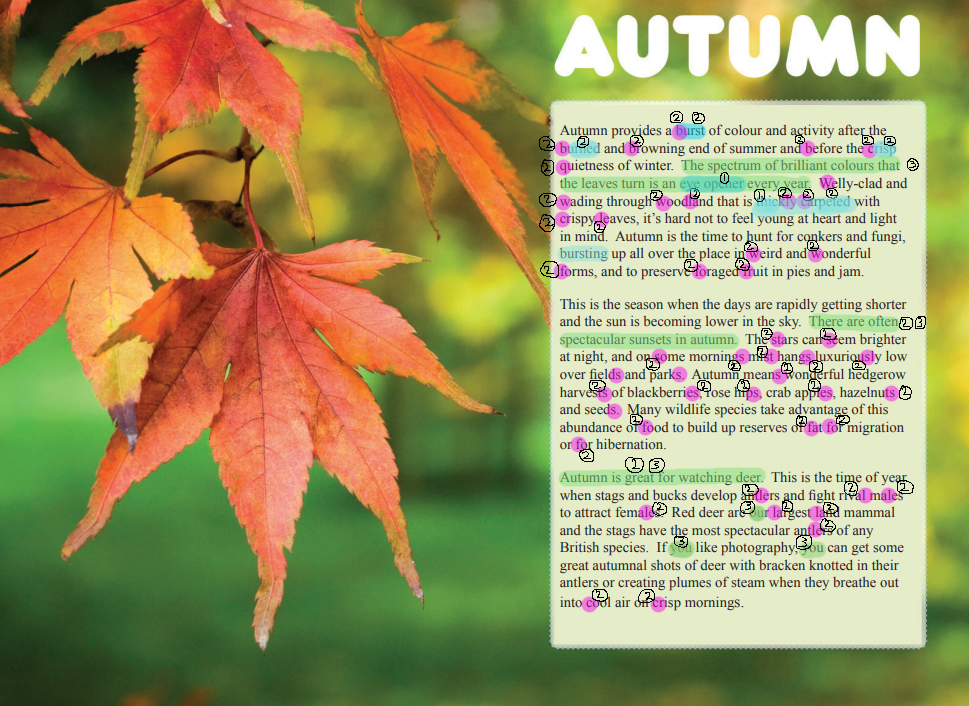More examples – 2
Here’s another example source – again taken from a past GCSE English Language exam paper. It’s an extract from a non-fiction book about nature.

The question will be something like this:
"Explain the ways in which language is used for effect in the text. Give some examples and analyse the effects."
This is how we suggest you tackle this question:
1. Write down the four language feature (PSPS) headings:
- Pretending
- Sound
- Persuasion
- Speech
2. Highlight each of the headings in a different colour, e.g.:

3. Write down the four effects headings, numbering them 1 to 4:
- Understand
- Sense
- Respond
- Remember
4. Now read through the source text and highlight every language feature heading you encounter in the highlight colour you’ve given it.
5. Consider the effect that each highlighted language feature has on you and write down the number of the effect heading (from step 3 above) next to the appropriate highlighted text.
The source text should now look something like this:

Answering the question:
Here’s how we chose to answer this one. Again, words in red are for your guidance only – not part of the actual answer.
Brief introduction
This is a sickly, sentimental, shallow piece about autumn that reveals the writer’s apparent lack of range in the use of literary techniques. It is peppered with alliteration – and that’s about all, unless you count superficiality, cliché and banality as literary features.
The alliteration is pleasing at first, but soon becomes excessive and cloying, as if the writer is seizing every opportunity to show off his or her newfound skill of writing alliteratively (occasionally consonantly and sibilantly), like a child with a new toy.
Language feature: sound – alliteration
The alliteration starts in the very first sentence. “Autumn provides a burst of colour and activity after the burned and browning end of summer and before the crisp quietness of winter.”
Effect – sense, remember
Initially, the alliteration appeals to the senses, making the introduction to the piece pleasing to the “mind’s ear”.
Language feature: pretending (imagery)
The first sentence also contains some imagery, such as “burst of colour and activity after the burned and browning end of summer.” However, this doesn’t ring very true – many would prefer summer to winter, and most would consider summer – even the end of it – to be more a time of activity than autumn. “. . . burst of colour” implies a quick transition from green leaves to yellow, orange and red ones, whereas this change is usually rather slow. I associate “burst of colour” more with spring – when plants flower in quick succession – than with autumn. “The burned and browning end of summer” belies the fact that many colourful plants, both wild and in the garden, flower towards the end of summer. The truth about autumn is that, apart from the undeniably beautiful aspects of the season, there is usually also plenty of cloud and rain as well as chilly days – none of which are mentioned in this very selective view of the characteristic features of autumn.
Effect: sense
Imagery appeals to the reader’s senses and can bring descriptions to life in the mind’s eye; unfortunately, in this article it has not worked as it appears disingenuous.
Language feature: pretending (metaphor), persuasion
“The spectrum of brilliant colours that the leaves turn is an eye opener every year” is intended to persuade the reader that autumn is an unmissable spectacle that holds some kind of surprise element. However, the metaphoric term “eye opener” is possibly misleading. “Eye opener” means something startling, revelatory, surprising or enlightening, but in this context it appears to be used, incorrectly, to literally mean that it makes you open your eyes. Given that autumn happens inexorably every year, with attendant changing of leaf colours, it is hardly an “eye opener” in the accepted sense of that term. It would be more of an eye opener if leaves didn’t change colour in the autumn.
Effect: respond
Using imagery to persuade readers can be highly effective – but unfortunately not in this case.
Language feature: sound – alliteration
“Welly-clad and wading through woodland that is thickly carpeted with crispy leaves” brings us some more alliteration – and this is where my fear begins that the writer is focused too much on this language feature. Also, while “crispy leaves” suggests dryness, autumn is actually noted for dampness, so the carpet of leaves might more realistically be soggy.
Effect: sense
Again, the alliteration sounds pleasant to the “mind’s ear” – relaxed, unhurried and sensuous.
Language feature: pretending (metaphor)
In the same sentence, the writer uses the metaphorical expressions “wading through woodland” and “thickly carpeted”. Wading through woodland sounds rather odd until we see that this probably refers to the thickly carpeted leaves; “thickly carpeted” is cliché, or very close to it.
Effect: sense – (visualisation)
However, the two metaphors do help the reader to visualise the scene as people walk through the autumn woods.
Language feature: pretending (metaphor) and sound (alliteration)
In the last sentence of the third paragraph, there is some more metaphoric “bursting” – this time fungi is bursting up all over the place in “weird and wonderful (another cliché, more alliteration) forms.” The word “forms” chimes with “foraged fruit in pies and jam.”
Effect: response
This confirms the readers suspicions that this is a mainly vacuous piece of writing in which the writer is desperately trying to impress with lame metaphors and gratuitous volleys of alliteration.
Language feature: persuasion (by being economical with the truth)
The bland statement, “There are often spectacular sunsets in autumn” is something of a truism, possibly calculated to further promote the idea that autumn is a fantastic time for all of us. There’s probably a greater chance that an autumn evening will be cloudy and grey, but who needs to be objective when they’re selling a season?
Effect: response
The writer is trying hard to peddle the idea that autumn is a great time, but is still rather unconvincing. It could raise the profile of autumn among those who are fairly easily influenced; people who can live without sunsets and know the usual nature of autumnal weather in the UK may be unimpressed.
Language feature: sound (sibilance, alliteration and consonance)
There is some effective sibilance in the lines: “The stars can seem brighter at night, and on some mornings mist hangs luxuriously low over fields and parks. Autumn means wonderful hedgerow harvests of blackberries, rose hips, crab apples, hazelnuts and seeds. Many wildlife species take advantage of this abundance of food to build up reserves . . .” However, it goes on too long and, as sibilance is a “sound” device similar to alliteration, its overuse again indicates desperation to impress. Within the sibilance, we have yet more alliteration and consonance: “. . . on some mornings mist hangs luxuriously low over fields . . .” The term “Luxuriously low” doesn’t bear close scrutiny – mist is low by its very nature, but “luxuriously low”? – is that an extra special kind of mist? Maybe the writer chose the word “luxuriously” purely on the basis of its harmony with “low” and “fields”. . .
Effect: sense
It may sound effective in isolation, but in a sea of language features based almost solely on sound, it’s lost and over the top. It’s really starting to annoy, and pursuit of sound effects appears to be motivating choice of words, rather than accuracy and precision.
Language feature: repetition (probably unintentional)
In the last line of the piece, there is reference to “…crisp mornings” – this is the third time the writer has used the word crisp or crispy. We’ve had the crisp quietness of winter, crispy leaves and now crisp mornings. While it is so easy to forget what you’ve already written as you are composing text, a careful re-read should have alerted the author – or an editor – to this overuse of the word.
Effect: respond
Where it is intentional, repetition is fine, but this appears to be more like sloppy writing and editing. Therefore the response is a sense of weariness with the author’s predilections – and this is true of the whole piece.




